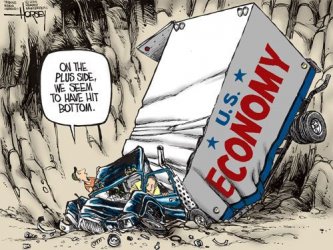R
rdean
Guest
Which regulations did Bush cut?
We've been discussing this in the since 2009 88 percent thread and I have two long posts in there that detail what the bush administration did to the financial industry. You can click the quote buttons on those posts and reply to them as I've been inviting everybody else to do.
Two long posts with no proof Bush deregulated the financial industry.
Try this one.
McCain Embraces Regulation After Many Years of Opposition
In 2002, McCain introduced a bill to deregulate the broadband Internet market, warning that "the potential for government interference with market forces is not limited to federal regulation." Three years earlier, McCain had joined with other Republicans to push through landmark legislation sponsored by then-Sen. Phil Gramm (Tex.), who is now an economic adviser to his campaign. The Gramm-Leach-Bliley Act aimed to make the country's financial institutions competitive by removing the Depression-era walls between banking, investment and insurance companies.




